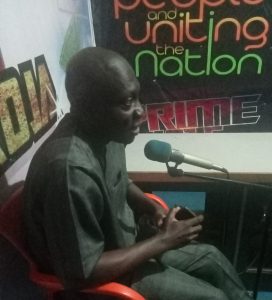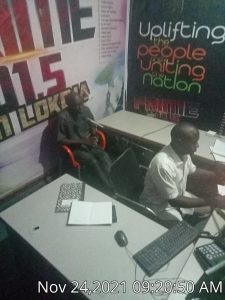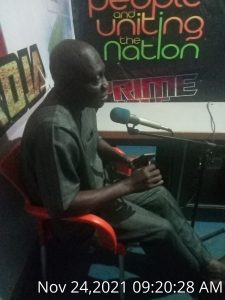Stakeholders have been asked not to view young people as agents of conflict and destruction, rather they should be seen as agents of peace, intercultural, inter-religious dialogue and advocates for social cohesion in communities if the right environment is created.

The Editor/Publisher of Thenigerianpost, Abu Micheal, made the appeal while making a presentation on the FRCN Radio Station, Prime FM on the Roles of key stakeholders in fostering peace and building resilience of vulnerable groups Episode 2.

The FRCN Grace FM Program was sponsored by Actionaid Nigeria in partnership with Participation Initiative for Behavioural Change in Development (PIBCID), with funding from, Global Community Engagement and Resilience Fund, (GCERF).

Mr. Abu called for the need to enhance structures that would promote the participation of Youths in Peace building, actively contribute to their engagement with decisions and activities that affect their wellbeing,
The Publisher said key stakeholders in peace building is the youth, said considering that 65% of the population in Nigeria consists of young people, has become increasingly important that, rather than see them agents of conflict and destruction, they should be seen as agents of peace, intercultural, inter-religious dialogue and advocates for social cohesion in communities.
Mr. Abu said the family remains the most critical stakeholders in peace building, but lamented that the neglect of family values and morals, failure of parental responsibilities is the bottom line factor for violence in the society.
While pointing out that the Mother and father remains the first teacher of a child, with the home as the first school, expressed worries that the parents and home has abdicated their roles in peace building to househelps and the school, said until there is a great attachment by parents and the home to parental upbringing, things would continually move from bad to worst.
He further called on Religious organizations to take their rightful place in peace building, expressed happiness that some Religious organizations are in the forefront of peace building, but lamented that some few others are still acting in the promotion of violence.
Mr. Abu called on the Educational Institutions who are major stakeholders in peace building, said the schools should complement the roles of parents in preaching peace building, urged schools to improve on their curriculum to include peace building, dialogue, building resillience, and entrepreneurship skills that ends up empowering youths to be self sustainable.
The Publisher called on Political Actors, Government and others who are mentors to the younger generation to promote peace and not violence, caution against hate speeches that would inflame the society.
Amidsts challenges of having young people engaged more in violence, Mr. Abu said young people have equally shown that they are able to play active roles as peacemakers, mediators and peacebuilders as recognised with the adoption of Resolution 2250 by the United Nations security Council in 2015.
He advocated the use one of the pillars of the UN’s Youth, Peace and Security (YPS) agenda which includes a commitment to ensuring the participation of young people in conflict prevention and resolution, violent prevention, and the promotion of social cohesion, said “This will make the youth change attitudes towards people, traditions, religions and beliefs. He noted that young people will discover to combine their passion with patience, appreciate the importance of peaceful co-existence and will be in charge of depending on the frontiers of peace and non-violence.
He however said there is a greater need today among the youth to reevaluate their understanding about their leadership capacity, stressing that there is an urgent need to relook the need for community leadership and take opportunities offered to prioritize leadership development programs because being deficient in knowledge about basic decision making encumbers progress and therefore results in conflicts.”
Additionally, the Guest said there is the need for inclusion of young people in peace building processes, facilitate peace in a society as the young people’s energies are redirected to the implementation of constructive peace projects.
Mr. Abu said Peace building efforts should not only be about signing agreements to stop violence but should also involve a social change that can be brought about by formal, non-formal, and informal education; school-to-work transition; peace building and conflict resolution; youth engagement, participation, and empowerment; workforce development and livelihoods.
The Radio Program which was a phone in contribution Program, had callers to contribute to the topic of discussion, insisting that failure of the family settings, with politically motivated violence caused by Political actors as major reason for violence in the society, want parents, schools and Government to strive to have measures towards building Peaceful Coexistence.
Callers like Dennis Osas, from Ayingba, Abdulkadir Usman, Agenebode, commended ActionAid Nigeria Program, hinged the reason of violence to failures in family values and governance.
